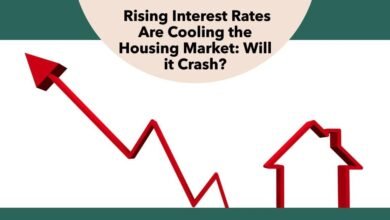Mortgage experts explain if you should lock into fixed deal or move to tracker

Some homeowners may be tempted to move to a tracker over expectations that the Bank of England will cut its base rate at some point this year – but is this the right move for you?
Mortgage rates have been creeping up again, leaving many homeowners who need to remortgage wondering what their next step should be.
Generally speaking, mortgages are either fixed, where your rate is set for a period of time, or they are variable, which means your rate changes from time-to-time. Deciding what type of deal to sign up to next isn’t an easy one for homeowners, given how much interest rates have risen over the last couple of years.
The Bank of England base rate, which influences borrowing costs, was at an historic low of 0.1% in December 2021. Fast forward to today, and the base rate is now at 5.25%. This is important, because if you have a tracker mortgage, your deal follows the base rate. But equally, those who have been on a cheaper fix are now set to pay hundreds of pounds more each month when they remortgage due to how much rates have risen by.
The Bank has hiked its base rate to try and tackle inflation, which at its worst point, hit 11.1% in October 2022. It has since come down to 4%, meaning all eyes are on the Bank to try and predict when it will begin to cut its base rate. The Bank has kept the base rate at 5.25% at its last four meetings.
January saw more than 50 residential lenders cut their mortgage deals – but rates have been rising again this month over fears that it may now take the Bank of England longer than expected to cut its base rate. HSBC, NatWest and Virgin Money all increased the cost of new mortgage deals last week, hot on the heels of Santander, Coventry Building Society and TSB also raising rates. It means no sub-4% deals remain, after the 3.99% five-year fixed rate for remortgage from HSBC was pulled.
Should I fix my mortgage or move to a tracker?
Some homeowners may be tempted to move to a tracker over expectations that the Bank of England will cut its base rate at some point this year. But it is important to remember that no one knows for sure what will happen over the next few months, or how soon rates could be cut – which is why you may be in a dilemma when you come to remortgage.
There is a lot to take into account, such as what you can currently afford and what major life events you have coming up over the next few years. You also need to consider any early repayment fees and exit fees into account if you’re locking into a new fixed deal. We spoke to several financial experts to get their views.
As of today, the average two-year fixed residential mortgage rate is sitting at 5.75%, according to Moneyfacts. This is up from an average rate of 5.74% on the previous working day. The average five-year fixed residential mortgage interest rate is at 5.33% which is up slightly from 5.32% yesterday. You can normally lock in a new deal up to six months before the end of your current mortgage.
Alison Pallett, Sales Director at Nottingham Building Society said: “A fixed rate mortgage means homeowners have the security of regular monthly payments, protecting them from potential interest rate hikes. Picking a shorter fixed term allows flexibility, preventing borrowers from being secured into a long-term commitment and benefiting from potentially lower rates in the future.
“Tracker mortgages typically have fixed terms, usually two or five years. This option can be tempting when interest rates are expected to remain low or decrease, as borrowers stand to benefit from lower repayments. In this circumstance, borrowers may also have the option to overpay, meaning the overall loan is paid back more quickly.
“Homeowners looking for stability and predictability may choose the fixed rate option, while those comfortable with some level of uncertainty and potential cost savings may lean towards a tracker-rate mortgage. But it really comes down to individual circumstances and I would always urge borrowers to seek financial advice before making a decision.”
Lewis Shaw, Owner and Mortgage Expert at Shaw Financial Services said: “A fixed rate may be appropriate if you’re a cautious person who doesn’t want to take the risk of fluctuating mortgage payments. Conversely, if you’re happy to take the risk that your mortgage payments can change for better or worse, a tracker may be suitable.
“The reality is there is no one size fits all. What you should do is talk to a good quality advisor who can determine your circumstances, plans, and end goals. Only then can an appropriate recommendation be made that’s specific to you and you alone.”
Katie Hughes, Director of Tamworth Financial Services said: “Many economists predict that interest rates will fall over the next couple of years, potentially leading people to consider trackers as their best option. Buyers need to be mindful of the fact that when rates do fall, it’s unlikely they will fall quickly.
“Currently, tracker rates tend to be higher than most fixed rates, especially for those with smaller deposits. It raises the question of how long it will take for tracker rates to align with existing fixed-rate products.”
Roland McCormack, Mortgage Distribution Director at TSB said: “Over 90% of UK mortgage buyers are currently fixing, as people like certainty. Choosing the right product is a really important decision, but what is right for you will depend on your personal circumstances. That’s why I’d always encourage people to get advice from an expert.”
Alan Davison, Director of Customer Sales at Together said: “Many will find opting for a fixed rate deal gives a greater level of certainty, with consistent monthly payments for the fixed period of the deal. Those with a big life moment happening within the next two to five years – including changing their employment type or income, starting a family, and possibly moving home – then a two-year fix deal could be better to avoid any potential early repayment charges that would come with a five-year fix.
“When it comes to tracker mortgages, we have not seen many good tracker products since the financial crash of 2008. However, I’d expect to see more of these on the market this year onwards, offering more choice for borrowers. Anyone taking out a tracker mortgage will need to be mindful of the fact its rate could also go up, which is a possibility if there are any more major shocks to the economy.”
Source link





